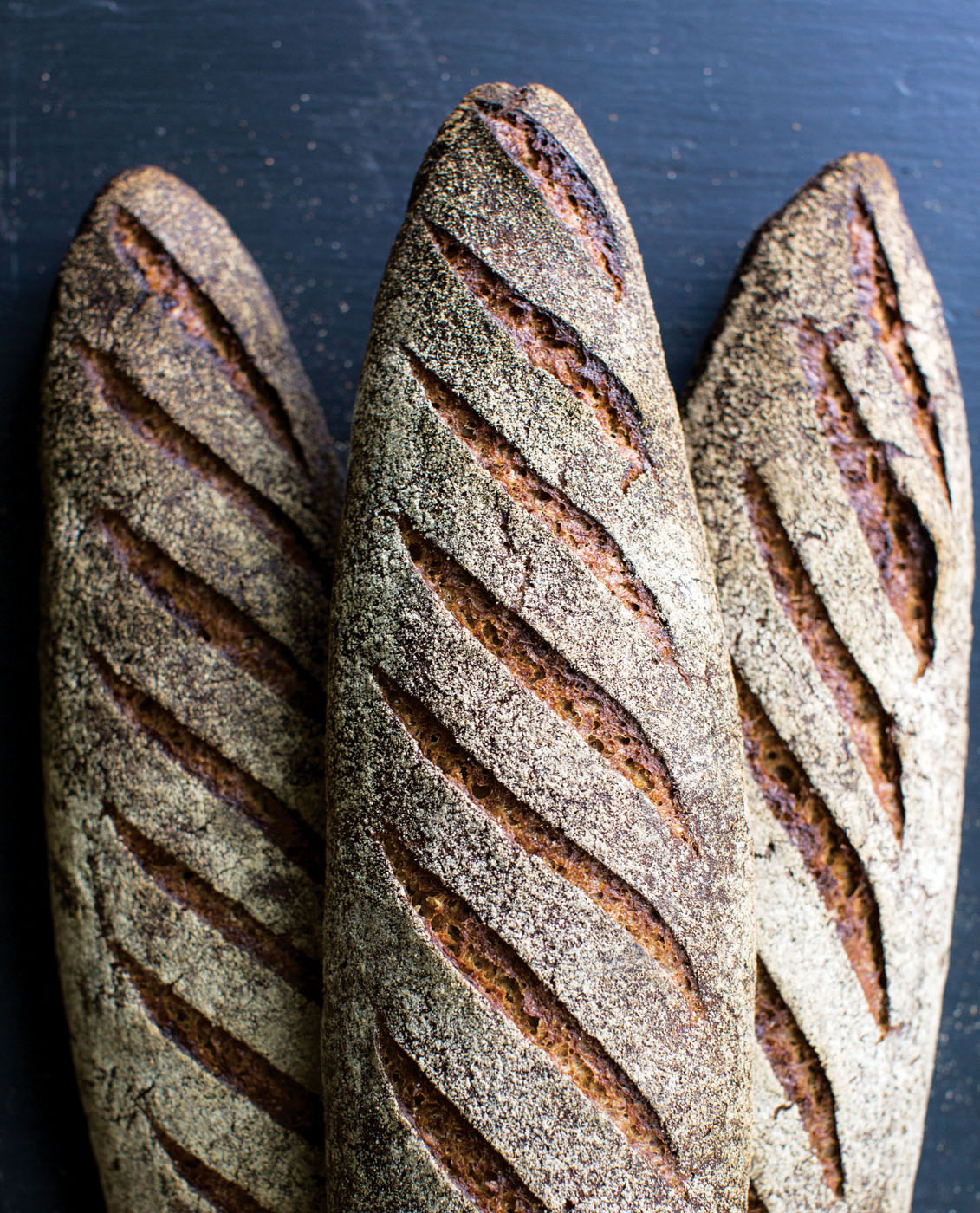
Yield: 2 medium bâtards
TOTAL FORMULA
PREFERMENTED FLOUR: 40%
| INGREDIENTS | METRIC (GRAMS) | VOLUMETRIC (APPROXIMATE) | BAKER’S % |
| Whole rye flour | 484 | 4½ cups | 66% |
| All-purpose flour | 250 | 2 cups + 1 tablespoon | 34% |
| Water | 587 | 2½ cups + 1 tablespoon | 80% |
| Salt, fine | 15 | 2½ teaspoons | 2% |
| Yeast, dry instant | 5 | scant 2 teaspoons | 0.70% |
| Sourdough culture | 59 | ¼ cup | 8% |
| Dried cherries or currants, toasted pecans, or walnuts (optional) | 200 | 1¾ cups | |
| Total Weight | 1,400 | All | 190.70% |
RYE SOURDOUGH
| INGREDIENTS | METRIC (GRAMS) | VOLUMETRIC (APPROXIMATE) | BAKER’S % |
| Whole rye flour | 293 | 2¾ cups | 100% |
| Water | 235 | 1 cup | 80% |
| Sourdough culture | 59 | ¼ cup | 20% |
| Total Weight | 587 | All | 200% |
FINAL DOUGH
| INGREDIENTS | METRIC (GRAMS) | VOLUMETRIC (APPROXIMATE) | |
| Water | 352 | 1½ cups + 1 tablespoon | |
| Rye sourdough | 587 | All | |
| All-purpose flour | 250 | 2 cups + 1 tablespoons | |
| Whole rye flour | 191 | 1¾ cups | |
| Salt, fine | 15 | 2½ teaspoons | |
| Yeast, dry instant | 5 | scant 2 teaspoons | |
| Dried cherries or currants, toasted pecans or walnuts, optional | 200 | 1¾ cups | |
| Total Weight | 1,400 | All |
DAY ONE
RYE SOURDOUGH
In a medium bowl, combine the tepid water (75°F to 80°F) and the sourdough culture. Mix with your hands and fingers until the culture is broken up and well distributed in the water, then add the flour.
Mix briefly, then knead until smooth.
Cover and set at room temperature for 12 to 16 hours.
PREPARE
If adding toasted nuts to the pain de seigle, toast the nuts in a large frying pan over low heat, stirring occasionally until they take on some color and are fragrant. Different nuts and seeds toast at different rates, so keep an eye on them! Cool to room temperature. Chop them coarsely prior to use.
If adding dried fruit such as cherries or cranberries, chop them prior to use. Currants may be added whole.
DAY TWO
PREPARE
If adding toasted nuts or dried fruits, soak them in hot water for 5 minutes, then drain before using.
MIX
Calculate temperatures. See Setting Temperatures for instructions. Desired dough temperature: 78°F to 80°F
In a large mixing bowl, combine the final dough water and rye sourdough. Mix with your hands until the rye sourdough is broken up in the water, then add the flours, salt, and yeast. Stir with the handle end of a wooden spoon until the dough forms a shaggy mass. If you find it easier, after some stirring, scrape the dough out of the bowl with a plastic scraper onto your work surface and knead briefly with your hands just until the dough comes together. Resist the urge to add more flour. Scrape the dough off the work surface and return it to the bowl for bulk fermentation.
If adding nuts or fruit, place them on top of the mixed dough and fold briefly to begin incorporation. It doesn’t need to be homogeneous; these ingredients will fully incorporate during folding.
BULK FERMENTATION
Scrape down the sides of the mixing bowl and allow the dough to rise, covered, for 1 hour at room temperature, folding as directed below.
FOLD
Fold after 30 minutes, then leave untouched for the rest of the hour. See Folding for instructions.
Note that doughs with a significant percentage of rye flour do not handle the same as wheat doughs. They will feel not stretchy or elastic, but rather more claylike.
DIVIDE AND PRESHAPE
Divide the dough into 2 pieces weighing about 700 grams each. Note that if you have opted to add fruit or nuts, the weight of the pieces of dough will increase. See Dividing for instructions.
Preshape as tubes. See Preshaping for instructions.
Cover and let rest for 15 minutes.
SHAPE
Shape as bâtards roughly 14 inches long. See Shaping for instructions.
Place, seam side up, on a baker’s linen (couche) or tea towel generously floured with whole rye flour. Pleat the couche between the loaves to support their sides as they rise. See Shaping for instructions.
PROOF
Cover and proof for 30 to 45 minutes at room temperature.
BAKE
During the proof, preheat the oven to 450°F with a baking stone and steaming system in place. See Baking for instructions.
Transfer the loaves to parchment paper or a baker’s peel, gently inverting them so that the underside, which was against the dusted tea towel or linen, becomes the top.
Score the bread prior to loading. See Scoring for ideas and tips.
Slide the loaves onto the preheated baking stone.
Bake with steam for 35 to 40 minutes. After 25 minutes, carefully remove any steaming devices, lids, or parchment paper. Rotate the loaves on the stone.
At 35 to 40 minutes the loaves should be well colored. Turn off the oven, prop open the door a few inches, and allow the loaves to dry for an additional 10 minutes.